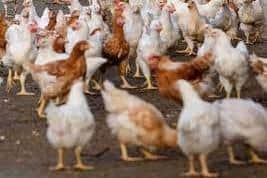Suspected bird flu at Ballinderry leads to cull of 28,000 birds
and live on Freeview channel 276
A commercial duck farm in the Coagh area, consisting of some 22,000 birds, had to be culled recently in what has since been confirmed as a positive outbreak of HPAI H5N1 following results from the National Laboratory.
This takes Northern Ireland’s number of confirmed outbreaks so far to four, with one suspected, awaiting confirmation.
Advertisement
Hide AdAdvertisement
Hide AdSpeaking after the meeting with a wide range of key stakeholders from the poultry industry including producers, transporters and feed companies, the Minister said: “Unfortunately, over the weekend, we have detected one more possible incursion of HPAI H5N1 in a commercial flock in County Londonderry.


“There is no doubt that this is a very difficult time for the poultry industry as they try to prevent an outbreak in their own flock and I do not underestimate how stressful it is, to be so vigilant every hour, of every day. But I can assure you, suffering an outbreak and facing the cull of your flock is even more devastating and I urged the poultry industry to take further steps to assist farm families and business to take every precaution possible to protect their birds and their livelihoods.
“Right across Europe and the UK, we are seeing this strain of Avian Influenza wipe out small backyard keepers with one or two birds, to large commercial businesses with over 500,000 birds.
“It’s extremely disappointing that this is now the worst outbreak ever across the UK and yet another stark reminder of the importance of excellent biosecurity measures which ultimately, are the only protection we have in preventing Avian Influenza getting into our housed flocks. This is a particularly persistent strain and it will use any lapse in biosecurity to gain access to a flock. Everyone must not only use our biosecurity checklist to see if they’ve ticked all the boxes, but get into a routine of checking it every morning. Make sure there are no forgotten or damaged access points and review your procedures every day to reduce the risk.
“I would like to thank the poultry sector for working so hard to protect our valuable industry and for how willing they are to make significant sacrifices to minimise the spread of this outbreak.”